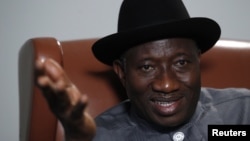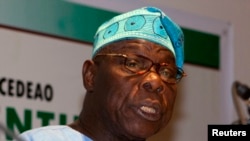LAGOS —
Nigerian President Goodluck Jonathan on Monday accused one of his mentors and predecessors, Olusegun Obasanjo, of stirring up ethnic hatred against him and of threatening national security.
Obasanjo, twice president and a powerful political godfather who nurtured Jonathan's own rise to power, has progressively fallen out with the current president. In a letter leaked earlier this month he said it would be “morally flawed” for Jonathan to seek a second term in a 2015 poll.
“Your letter is clearly a threat to national security as it may deliberately or inadvertently set the stage for subversion,” Jonathan told Obasanjo in a reply published in local media.
“It appears that your letter was designed to incite Nigerians from other geopolitical zones against me and also calculated to promote ethnic disharmony,” he said.
The open criticism from Obasanjo, one of Nigeria's most high-profile figures, has deepened a rift within the ruling party over Jonathan's assumed plan to seek another term at the helm of Africa's second biggest economy and top oil exporter.
One week after Obasanjo's letter, some 37 lawmakers defected to the opposition coalition, giving it a slim majority in the lower house of parliament and delivering a blow to any re-election bid by Jonathan.
Jonathan has not said he will run, but his supporters note that he has a constitutional right to. That has upset ruling party northerners, who think it violates an unwritten rule that power should rotate each two terms between the largely Christian south and mostly Muslim north.
Jonathan is a southern Christian - as is Obasanjo - and he became president in 2010 after his predecessor, Umaru Yar'Adua, a northern Muslim, died just three years into his first term.
The more divisive the election race, the more money is likely to be spent fighting it at a time when Nigeria's fiscal position normally slips, and the greater the risk of violence.
Criticism
In his criticism of Jonathan's record, Obasanjo echoed complaints often made by the president's detractors, for instance that he has failed to deal with an Islamist insurgency in the north by treating it purely as a security issue instead of tackling the underlying causes of poverty and isolation.
Jonathan retorted on Monday that his government has invested in alleviating poverty in the north, focusing on education, including the creation of nine northern universities.
The former president likened the current situation to the tenure of General Sani Abacha, whose five years of military rule in the 1990s were marred by human rights abuses and massive looting of funds from Africa's biggest oil producer.
Jonathan dismissed as “baseless” Obasanjo's allegation that he was “clandestinely acquiring weapons” as Abacha once did, in case he cannot secure another term of office by peaceful means.
The president also defended his record on corruption, noting it had flourished during both of Obasanjo's stints in office.
“The seed of corruption in this country was planted a long time ago, but we are doing all we can to drastically reduce [it],” Jonathan said, dismissing as “misconstrued” talk that billions of dollars have gone missing from the state oil firm.
Jonathan denied being biased in favor of his Ijaw ethnic group, a common criticism repeated by Obasanjo.
Despite the current discord in Nigeria's political elite, most analysts believe Jonathan would win the vote if he chooses to run, albeit with a weaker mandate.
Obasanjo, twice president and a powerful political godfather who nurtured Jonathan's own rise to power, has progressively fallen out with the current president. In a letter leaked earlier this month he said it would be “morally flawed” for Jonathan to seek a second term in a 2015 poll.
“Your letter is clearly a threat to national security as it may deliberately or inadvertently set the stage for subversion,” Jonathan told Obasanjo in a reply published in local media.
“It appears that your letter was designed to incite Nigerians from other geopolitical zones against me and also calculated to promote ethnic disharmony,” he said.
The open criticism from Obasanjo, one of Nigeria's most high-profile figures, has deepened a rift within the ruling party over Jonathan's assumed plan to seek another term at the helm of Africa's second biggest economy and top oil exporter.
One week after Obasanjo's letter, some 37 lawmakers defected to the opposition coalition, giving it a slim majority in the lower house of parliament and delivering a blow to any re-election bid by Jonathan.
Jonathan has not said he will run, but his supporters note that he has a constitutional right to. That has upset ruling party northerners, who think it violates an unwritten rule that power should rotate each two terms between the largely Christian south and mostly Muslim north.
Jonathan is a southern Christian - as is Obasanjo - and he became president in 2010 after his predecessor, Umaru Yar'Adua, a northern Muslim, died just three years into his first term.
The more divisive the election race, the more money is likely to be spent fighting it at a time when Nigeria's fiscal position normally slips, and the greater the risk of violence.
Criticism
In his criticism of Jonathan's record, Obasanjo echoed complaints often made by the president's detractors, for instance that he has failed to deal with an Islamist insurgency in the north by treating it purely as a security issue instead of tackling the underlying causes of poverty and isolation.
Jonathan retorted on Monday that his government has invested in alleviating poverty in the north, focusing on education, including the creation of nine northern universities.
The former president likened the current situation to the tenure of General Sani Abacha, whose five years of military rule in the 1990s were marred by human rights abuses and massive looting of funds from Africa's biggest oil producer.
Jonathan dismissed as “baseless” Obasanjo's allegation that he was “clandestinely acquiring weapons” as Abacha once did, in case he cannot secure another term of office by peaceful means.
The president also defended his record on corruption, noting it had flourished during both of Obasanjo's stints in office.
“The seed of corruption in this country was planted a long time ago, but we are doing all we can to drastically reduce [it],” Jonathan said, dismissing as “misconstrued” talk that billions of dollars have gone missing from the state oil firm.
Jonathan denied being biased in favor of his Ijaw ethnic group, a common criticism repeated by Obasanjo.
Despite the current discord in Nigeria's political elite, most analysts believe Jonathan would win the vote if he chooses to run, albeit with a weaker mandate.






